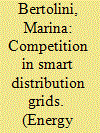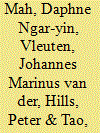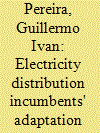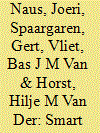|
|
|
Sort Order |
|
|
|
Items / Page
|
|
|
|
|
|
|
| Srl | Item |
| 1 |
ID:
177110


|
|
|
|
|
| Summary/Abstract |
This paper explores the trends, step changes and innovations that could impact the integration of renewable energy into electricity systems, explores interventions that may be required, and identifies key areas for policy makers to consider. A Delphi approach is used to collect, synthesise, and seek consensus across expert viewpoints. Over sixty experts across a range of geographies including the US, Europe, New-Zealand, Australia, Africa, India and China participated. They identified 26 trends, 20 step changes, and 26 innovations that could lead to major shifts in the design, operation, or management of electricity systems. Findings suggest that key challenges are not technological. Instead they are with delivering an aligned vision, supported by institutional structures, to incentivise, facilitate, and de-risk the delivery of a completely different type of energy system. There is a clear role for government and policy to provide a future energy vision and steer on strategic issues to deliver it; to create space for new actors and business models aligned with this vision; and to create an environment where research, development, demonstration and deployment can promote technologies, system integration and business model innovation at a rate commensurate with delivering net-zero electricity systems.
|
|
|
|
|
|
|
|
|
|
|
|
|
|
|
|
| 2 |
ID:
121386


|
|
|
|
|
| Publication |
2013.
|
| Summary/Abstract |
For a long time considered as technologically mature, electric systems are now facing a period of rapid evolution, inspired by climate change concerns. Several studies show that current regulation of natural monopolies does not offer sufficient incentives for network operators (and network users) to participate in this process.
Taking Italy as a case study, this paper analyses how energy regulation can change to support the current transformation. We describe the recent regulatory interventions in the domain of smart grids, smart metering and electromobility, with a specific emphasis on the provisions aimed at fostering innovation-an issue that until recently has received almost no attention in the literature nor in the practice of regulation.
The progress we observe is considerable in all new areas of concern, and, above all, in the regulator's commitment to provide the right incentives for investments in demonstration projects: the acquisition of experience is regarded as essential to move to more sophisticated regulatory instruments. Finally, regulation is also increasingly concerned with network users, both traditional and new, with the objective to stimulate more active behaviours.
|
|
|
|
|
|
|
|
|
|
|
|
|
|
|
|
| 3 |
ID:
174955


|
|
|
|
|
| Summary/Abstract |
Smart grids are often considered a cornerstone of energy transition and market liberalization in electric industries. From a critical reading of the interdisciplinary academic and governmental literature, we draw a new definition of grid smartness that is based on the reduction of the volatility of market prices and flows. Then, relying on a simple industrial-organization model of the electric market, we analyze the impact of smart grids on competition among energy suppliers and on the incentives of distribution system operators to invest in it. We show that the risk-reduction effect of smart grids pushes firms to supply more energy. However, the latter can be compensated by an indirect competition effect of investments in smart grids which prevents the entry of firms into the market, though the aggregate effect on energy supply is always positive. We also find that distribution system operators under-invest in smart grids because they fail to internalize positive externalities on energy consumers and producers.
|
|
|
|
|
|
|
|
|
|
|
|
|
|
|
|
| 4 |
ID:
115647


|
|
|
|
|
| Publication |
2012.
|
| Summary/Abstract |
Consumers have a major role to play in smart grid technologies which can be instrumental in addressing climate change and energy challenges. However, little is known about how consumers perceive, and how they might respond to the opportunities that smart grid technologies offer. This paper reports the results from a Hong Kong survey (n=505). It contributes to the literature by providing a better understanding of the perceptions and behaviour of electricity consumers about the possible deployment of smart grids.
Our results indicate that Hong Kong consumers generally welcomed smart grid technologies and had a preference for energy saving, energy efficiency and renewable energy while they showed a high level of opposition to nuclear power. They displayed an interest in playing a much more informed and active role in energy decision-making, but they were sensitive to tariff increases. Motivations and barriers for consumers to support smart grid developments are also discussed. We conclude with a discussion of policy implications for effective consumer engagement. More policy attention is needed on demand-side measures, introducing institutional and regulatory changes, and modifying relationships between consumers, the government and utilities.
|
|
|
|
|
|
|
|
|
|
|
|
|
|
|
|
| 5 |
ID:
177431


|
|
|
|
|
| Summary/Abstract |
The transition to a digital, decarbonised, and decentralised energy system presents both risks and opportunities for the domestic consumer. Domestic ‘demand-side response’ (DSR), where household electrical consumption adjusts in response to external signals, has been envisioned in different ways with several trials demonstrating that DSR often has variegated and uneven consumer outcomes. This plurality of outcomes raises questions about the ‘winners’ and ‘losers’ of pursuing such policies and thus brings them into the realm of energy justice – a framing that seeks to understand the ethical implications of energy systems. This paper, based on an extensive review of current academic literature, evaluates the normative implications of DSR in relation to the eight principles of energy justice proposed by Sovacool and Dworkin (2015). Whilst there are several ways that DSR may create opportunities for furthering energy justice, there are also multiple risks of injustice, with much depending on how particular DSR programmes are designed and the presence or absence of sufficient policies to mitigate regressive outcomes. Further empirical research is required to better understand the conditions through which DSR can contribute to energy justice. We conclude by offering policy recommendations for those developing DSR or consumer protection policies related to DSR rollout.
|
|
|
|
|
|
|
|
|
|
|
|
|
|
|
|
| 6 |
ID:
176827


|
|
|
|
|
| Summary/Abstract |
The transition to a cleaner and smarter electricity system is being spurred by new policy approaches aiming at delivering a decentralized, digital, and decarbonized energy future. This calls for the adaptation of incumbent technologies, policies, and actors, as well as for the introduction of new system components. The changing role of electricity distribution systems, and of distribution system operators, has been a focal aspect of recent market design efforts, given the critical role of network infrastructure and the importance to adjust its operations, and regulatory framework. We build on a novel dataset from 124 DSOs and apply a methodology combining Factor analysis and a Tobit model to evaluate the role of market, regulatory, investment, and firm-level factors on technological, business model, and market design adaptation. Our results indicate that hybrid regulatory models contribute to DSOs adaptation. Investing in smart grids is found to have a positive effect on adaptation. Regarding firm-level characteristics, the results indicate that unbundling does not affect adaptation, however larger DSOs are found to be better able to adapt. These findings provide timely empirical evidence for advancing regulatory and policy approaches toward the adaptation of incumbents in a rapidly changing electricity sector.
|
|
|
|
|
|
|
|
|
|
|
|
|
|
|
|
| 7 |
ID:
150651


|
|
|
|
|
| Summary/Abstract |
The potential to schedule portion of the electricity demand in smart energy systems is clear as a significant opportunity to enhance the efficiency of the grids. Demand response is one of the new developments in the field of electricity which is meant to engage consumers in improving the energy consumption pattern. We used Teaching & Learning based Optimization (TLBO) and Shuffled Frog Leaping (SFL) algorithms to propose an optimization model for consumption scheduling in smart grid when payment costs of different periods are reduced. This study conducted on four types residential consumers obtained in the summer for some residential houses located in the centre of Tehran city in Iran: first with time of use pricing, second with real-time pricing, third one with critical peak pricing, and the last consumer had no tariff for pricing. The results demonstrate that the adoption of demand response programs can reduce total payment costs and determine a more efficient use of optimization techniques.
|
|
|
|
|
|
|
|
|
|
|
|
|
|
|
|
| 8 |
ID:
171438


|
|
|
|
|
| Summary/Abstract |
European energy policies call for an increased share of renewable energy sources and a more active role of the energy consumer. This is facilitated by, amongst others, buildings becoming energy flexible hubs, supporting smart energy grids with demand response strategies. While there is abundant technical research in this field, the related business and policy development is less well documented.
This research scopes existing policy programmes and identifies opportunities and barriers to business development supporting energy flexible buildings. Using examples from seven European countries, this work reviews influencing niche management factors such as existing policy instruments, business development cases and identified stakeholder concerns, using literature research, narrative analysis and stakeholder research.
National policy pathways show many differences but confirm that European buildings might become active players in the energy market, by providing energy storage, demand response and/or shifts in the use of energy sources. Slow sustained business development for energy flexibility services was mainly identified in the retail industry, and for energy service companies and aggregators. The direct involvement of end users in energy flexible buildings is still difficult. Stakeholders call for policy improvement, especially concerning the development of flexible energy tariffs, supporting incentives, awareness raising and more stakeholder-targeted business development.
|
|
|
|
|
|
|
|
|
|
|
|
|
|
|
|
| 9 |
ID:
150802


|
|
|
|
|
| Summary/Abstract |
The transition to smart grids is an on-going process that may both shape and be shaped by end-users' energy behavioural adaptations. This study explores current and potential energy behavioural adaptations in Portugal during the smart grid transition process. A web-based survey was made to a representative sample of a specific segment of Portuguese residential end-users. The survey evaluated current energy behaviours and hypothetical future behaviours in a dynamic pricing scenario. Results show this population segment has a positive predisposition towards smart technologies and demand shifting, but it is less likely to accept load control and switch to the liberalised energy market. Factors influencing the behavioural potential are mostly related with market regulation, households' practices and usage behaviours, interference with the private domain, information and technical aspects, and social values. To facilitate behavioural adaptations several strategies are recommended, such as improving the energy market regulation, assessing households' behaviours, prioritising actions already embedded in households daily routines, not interfering with their activities and ensure an override option, and improving energy services, trust and information provided to end-users. The conclusions of the present study are of utmost importance for the design of more effective demand response programmes and energy policies.
|
|
|
|
|
|
|
|
|
|
|
|
|
|
|
|
| 10 |
ID:
126554


|
|
|
|
|
| Publication |
2013.
|
| Summary/Abstract |
Smart grids represent one of the most significant evolutionary changes in energy management systems as they enable decentralised energy systems, the use of large-scale renewable energy as well as major improvements in demand-side-management. Japan is one of the pioneers in smart grid deployment. The Japanese model is characterised by a government-led, community-oriented, and business-driven approach with the launch of four large-scale smart-community demonstration projects. Our case study of large smart grid demonstration projects in Japan found that the Japanese government has demonstrated its high governing capacity in terms of leadership, recombinative capacity, institutional capacity, enabling capacity, and inducement capacity. However, the major limitations of the government in introducing some critical regulatory changes have constrained the smart grid deployment from advancing to a higher-order form of smart grid developments. This paper calls for more attention to be given to the importance of regulatory changes that are essential to overcome the technological lock-in, and the complementary roles of non-state actors such as the business sector and consumers to strengthen the governing capacity of the state.
|
|
|
|
|
|
|
|
|
|
|
|
|
|
|
|
| 11 |
ID:
117229


|
|
|
|
|
| Publication |
2013.
|
| Summary/Abstract |
This article analyses practices and perceptions of stakeholders on including users in smart grids experiments in the Netherlands. In-depth interviews have been conducted and smart grid projects have been analysed, using a Strategic Niche Management framework. The analysis shows that there is a clear trend to pay more attention to users in new smart grid projects. However, too much focus on technology and economic incentives can become a barrier. Some institutional barriers have been identified. New innovative business models should be developed to explore different options to involve users. The many pilot and demonstration projects that are taking shape or are being planned offer an excellent opportunity for such an exploration. Learning on the social dimensions of smart grids, and the international exchange of experiences can prevent a premature lock-in in a particular pathway.
|
|
|
|
|
|
|
|
|
|
|
|
|
|
|
|
| 12 |
ID:
133218


|
|
|
|
|
| Publication |
2014.
|
| Summary/Abstract |
Smart energy grids and smart meters are commonly expected to promote more sustainable ways of living. This paper presents a conceptual framework for analysing the different ways in which smart grid developments shape - and are shaped by - the everyday lives of residents. Drawing upon theories of social practices and the concept of informational governance, the framework discerns three categories of 'information flows': flows between household-members, flows between households and energy service providers, and flows between local and distant households. Based on interviews with Dutch stakeholders and observations at workshops we examine, for all three information flows, the changes in domestic energy practices and the social relations they help to create. The analysis reveals that new information flows may not produce more sustainable practices in linear and predictable ways. Instead, changes are contextual and emergent. Second, new possibilities for information sharing between households open up a terrain for new practices. Third, information flows affect social relationships in ways as illustrated by the debates on consumer privacy in the Netherlands. An exclusive focus on privacy, however, deviates attention from opportunities for information disclosure by energy providers, and from the significance of transparency issues in redefining relationships both within and between households.
|
|
|
|
|
|
|
|
|
|
|
|
|
|
|
|
| 13 |
ID:
114307


|
|
|
|
|
| Publication |
2012.
|
| Summary/Abstract |
The connection and distribution of growing, decentralized electricity generation from renewable energy sources (RES-E) is leading to massive investment needs. Besides investing in additional 'conventional' assets (e.g. cables), grid operators can also invest in innovative 'smart solutions' like local storage capacities or voltage regulation appliances, which may be a more suitable way of integrating RES-E. This paper investigates the influence of incentive regulation on the investment decision of grid operators to integrate RES-E. We describe the technical and regulatory background, explain the advantages of 'smart solutions' and present an approach for comparing investment scenarios. As an example, we calculate the profitability of investments in a case study of the German electricity market. We apply Data Envelopment Analysis (DEA) and Stochastic Frontier Analysis (SFA) to show the influence of the investment alternatives on grid operator efficiency objectives. We demonstrate that under current 'standard' incentive regulation, the grid operators gain profitability by avoiding investments and - if they are forced to invest - by not implementing 'smart solutions'. The results highlight the need to consider innovation in the regulation design. Further research should investigate specific instruments that can be used to account for innovation. Our brief discussion of such instruments provides a starting point.
|
|
|
|
|
|
|
|
|
|
|
|
|
|
|
|
| 14 |
ID:
169838


|
|
|
|
|
| Summary/Abstract |
The prospects for a smart power system have been widely discussed in the global electricity sector. Decarbonization, Digitalization and Decentralization are considered the main key drivers for this power system transition and Brazil is no exception to this universal trend. A search of the literature revealed few studies which attempt to address the main challenges and opportunities towards a smart grid power system in Brazil. This paper provides an up-to-date assessment of the present and potential capabilities of existing and future technologies, regulations and policies and attempts to identify how these elements are interrelated. Our findings add to a growing body of evidence suggesting that policies for Distributed Generation (DG), Demand-Side Management (DSM) and new tariff schemes are on a path of accelerated deployment in the country. The deployment of storage technologies, however, is at a slow pace of growth. We highlight the need to further develop new business models to address the various decentralized energy technologies and services that are emerging in the sector. The current net-metering system is considered a key issue to be addressed as this regulatory structure may shift the costs from DG to non-DG users.
|
|
|
|
|
|
|
|
|
|
|
|
|
|
|
|
| 15 |
ID:
109668


|
|
|
|
|
| Publication |
2011.
|
| Summary/Abstract |
This paper looks into the future world of smart grids from a rather different perspective than usual: that of uncertainties and the related risks and vulnerabilities. An analysis of the foreseen constituents of smart grids and of the technological, operational, economical and policy-driven challenges is carried out to identify and characterize the related uncertainties and associated risks and vulnerabilities. The focus is on the challenges posed to the representation and treatment of uncertainties in the performance assessment of such systems, given their complexity and high-level of integration of novel technologies. A general framework of analysis is proposed.
|
|
|
|
|
|
|
|
|
|
|
|
|
|
|
|
|
|
|
|
|